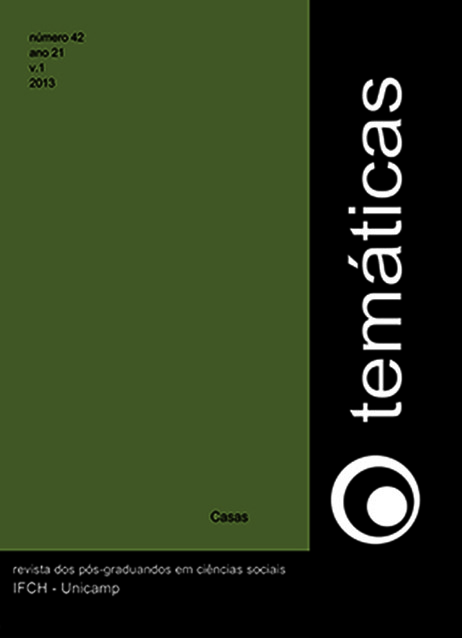Abstract
Today's Land Reform in South Africa is analyzed in terms of the meanings the land has for black people who speak isiZulu, as opposed to what white farmers consider to be models of failure. The houses, experienced throughout lives marked by exile and changes, are appreciated in their expression of conquest, through the history of the Kubheka family, contemplated by the South African land program, with a farm (previously white) to live. The shape of the houses is questioned here from Ingold's “perspective of the home”, when we pay attention to what people do in the houses where they live so that they consider them homes. In this sense, rituals that relate people, ancestors and houses, such as marriage, appear as imperatives to be performed. When dealing with the different forms that people and houses take in the changes of houses and ritual performances - which, in some way, when restoring people and houses to their original forms, reinvent the current forms -, we perceive creativity in the process of living and to transform houses into places considered fit for living, in terms of what people do, or want to do, and not what they should do according to the eyes of others.
References
BEINART, W.; DUBOW, S. Introduction: The historiography of segregation and apartheid. In: ______. Segregations and Apartheid in twenty century South Africa. London/New York: Routledge, 1995, p. 1-24.
BORGES, A. À Corte: notas etnográficas sobre conflitos fundiários na África do Sul. In: KANT DE LIMA, R; MOUZINHO, G. M. P. Segurança pública e justiça criminal. Niterói: Eduff, 2008a.
BORGES, A. Sem sombra para descansar: práticas, crenças, representações e outros males que acometem o Outro. In: CONGRESO LATINOMAERICANO de ANTROPOLOGÍA, San José. Antropología Latinoamericana: gestando un nuevo futuro, 2008b.
DOKE, C. M. et al. English-Zulu Zulu-English Dictionary. Johannesburg: Witswatersrand University Press, 2008.
FERGUSON, J. The Bovine Mystique: Power, Property and Livestock in Rural Lesotho. Man, New Series, v. 20, n. 4, p. 647-674, Dec. 1985.
GLUCKMAN, M. Parentesco y Matrimonio entre los lozi de Rodesia del Norte y los zulúes de Natal. In: RADCLIFFE-BROWN, A. R.; DARYLL, F. Sistemas Africanos de Parentesco y Matrimonio. Barcelona: Anagrama, 1982, p. 185-233.
GOTLIB, J. Getting People Back to the Land: interdependência entre Governo e ONGs na produção de beneficiários por terra da província de KwaZulu-Natal. Niterói. 2010. Dissertação (Mestrado em Ciências Jurídicas e Sociais) – Programa de Pós-Graduação em Sociologia e Direito, Universidade Federal Fluminense.
INGOLD, T. Part II: Dwelling. In: The Perception of the Environment – Essays on livelihood, dwelling and skill. Londres/Nova York: Routledge, 2000, p. 153-287.
JAMES, D. Gaining Ground? ‘Rights’ and ‘Property’ in South African land reform. Abingdon, Oxon: Routledge Cavendish, 2007.
KRIGE, E. J. The Social System of the Zulu. Pietemaritzburg: Shuter & Shooter, 1977.
KUPER, A. Wives for cattle – Bridewealth and marriage in Southern Africa. London: Routledge & Kegan Paul, 1982.
MONTEIRO, P. P. Desafiando o direito de propriedade: O embate entre diferentes concepções de direito à terra no contexto de reforma agrária sul-africana. Niterói. Monografia (Graduação em Ciências Sociais) – Faculdade de Ciências Sociais, Universidade Federal Fluminense. 2010.
MOYO, S. African Land Questions, Agrarian Transitions and the State: Contradictions of Neoliberal Land Reforms. Dakar: African Institute for Agrarian Studies, CODESRIA Working Paper Series, 2004.
MUNNIK, A.; ROOS, V.; GROGAN, T. Learn Zulu today. Pietermaritzburg, Cape Town, Randburg: Shuter & Shooter, 2008.
NTSEBEZA, L. Reconciliation and the land question. In: DU TOIT, F.; DOXTADER, E. In the Balance – South Africans debate reconciliation. Johannesburg: Jacana, p. 85-92, 2010.
POSEL, D.; RUDWICK, S.; CASALE, D. Is marriage a dying institution in South Africa? Exploring changes in marriage in the context of ilobolo payments. Agenda, 25:1, 102-111, 2011.
RADCLIFFE-BROWN, A. R. Introducción. In: RADCLIFFE-BROWN, A. R.; DARYLL, F. Sistemas Africanos de Parentesco y Matrimonio. Barcelona: Anagrama, p. 11-97, 1982.
RICHER, L.; MORRELL, R. Baba – Men and fatherhood in South Africa. Cape Town: HSRC Press, 2006.
ROSA, M. Mas eu fui uma estrela do futebol! As incoerências sociológicas e as controvérsias sociais de um militante sem-terra sul-africano. Mana, v. 17, n. 2, Rio de Janeiro, p. 365-394, Aug. 2011.
ROSA, M. Reforma agrária e land reform: movimentos sociais e o sentido de ser um sem-terra no Brasil e na África do Sul. CADERNO CRH, Salvador, v. 25, n. 64, p. 99-114, jan./abr. 2012.
SIGAUD, L. As condições de possibilidade das ocupações de terra. Tempo Social, v. 17, n. 1, p. 255-280, jun. 2005.
WHITE, Hylton. Outside the Dwelling of Culture: Estrangement and Difference in Postcolonial Zululand. Anthropological Quarterly, v. 83, n. 3, p. 497-518, Summer. 2010.

This work is licensed under a Creative Commons Attribution-NonCommercial-ShareAlike 4.0 International License.
Copyright (c) 2013 Aina Guimarães Azevedo

